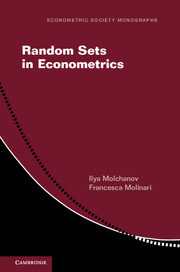Crossref Citations
This Book has been
cited by the following publications. This list is generated based on data provided by Crossref.
Avilés López, Antonio
and
Zapata García, José Miguel
2020.
Boolean Valued Representation of Random Sets and Markov Kernels with Application to Large Deviations.
Mathematics,
Vol. 8,
Issue. 10,
p.
1848.
Berry, Steven T.
and
Compiani, Giovanni
2020.
An Instrumental Variable Approach to Dynamic Models.
SSRN Electronic Journal ,
Molinari, Francesca
2020.
Handbook of Econometrics, Volume 7A.
Vol. 7,
Issue. ,
p.
355.
Molchanov, Ilya
and
Mühlemann, Anja
2021.
Nonlinear expectations of random sets.
Finance and Stochastics,
Vol. 25,
Issue. 1,
p.
5.
Barseghyan, Levon
Coughlin, Maura
Molinari, Francesca
and
Teitelbaum, Joshua C.
2021.
Heterogeneous Choice Sets and Preferences.
Econometrica,
Vol. 89,
Issue. 5,
p.
2015.
Cascos, Ignacio
Li, Qiyu
and
Molchanov, Ilya
2021.
Depth and outliers for samples of sets and random sets distributions.
Australian & New Zealand Journal of Statistics,
Vol. 63,
Issue. 1,
p.
55.
Dumav, Martin
and
Stinchcombe, Maxwell B.
2021.
The multiple priors of the open-minded decision maker.
Economic Theory,
Vol. 71,
Issue. 2,
p.
663.
Augustin, Thomas
and
Schollmeyer, Georg
2021.
Comment: On Focusing, Soft and Strong Revision of Choquet Capacities and Their Role in Statistics.
Statistical Science,
Vol. 36,
Issue. 2,
Settepanella, S.
Terni, A.
Franciosi, M.
and
Li, L.
2022.
The robustness of the generalized Gini index.
Decisions in Economics and Finance,
Vol. 45,
Issue. 2,
p.
521.
Augustin, Thomas
2022.
Uncertainty in Engineering.
p.
67.
Rodemann, Julian
Kreiss, Dominik
Hüllermeier, Eyke
and
Augustin, Thomas
2022.
Scalable Uncertainty Management.
Vol. 13562,
Issue. ,
p.
263.
Nguyen, Hung T.
2022.
Financial Econometrics: Bayesian Analysis, Quantum Uncertainty, and Related Topics.
Vol. 427,
Issue. ,
p.
111.
Gu, Jiaying
and
Russell, Thomas
2023.
A Dual Approach to Wasserstein-Robust Counterfactuals.
SSRN Electronic Journal,
Berry, Steven T
and
Compiani, Giovanni
2023.
An Instrumental Variable Approach to Dynamic Models.
The Review of Economic Studies,
Vol. 90,
Issue. 4,
p.
1724.
Gourieroux, Christian
Lu, Yang
and
Monfort, Alain
2023.
The Risk of Random Sets with Applications to Basket Derivatives.
SSRN Electronic Journal,
Pérez-Cendejas, Ulises
and
Pérez-Suárez, Gerardo
2024.
A Lévy–Itô decomposition on a class of topological monoids.
ESAIM: Probability and Statistics,
Vol. 28,
Issue. ,
p.
366.
Tian, Wan
and
Qin, Zhongfeng
2024.
The minimum covariance determinant estimator for interval-valued data.
Statistics and Computing,
Vol. 34,
Issue. 2,
Elías, Antonio
and
Nagy, Stanislav
2025.
Statistical properties of partially observed integrated functional depths.
TEST,
Vol. 34,
Issue. 1,
p.
125.
Chesher, Andrew
and
Rosen, Adam M
2025.
Extending the scope of instrumental variable methods.
The Econometrics Journal,
Vol. 28,
Issue. 1,
p.
109.



